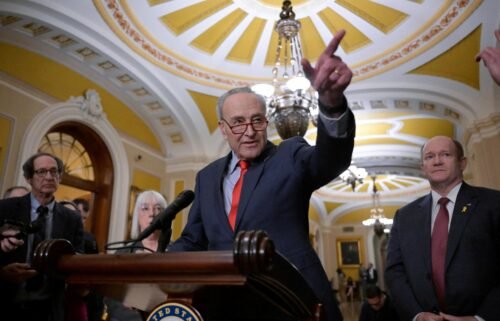‘Boys Don’t Cry’ and the uneven legacy of protections for transgender Americans

On its debut 20 years ago this month, Kimberly Peirce’s movie “Boys Don’t Cry” cast a rare spotlight on the experiences of a transgender man for a wide audience. The film continues to do this, if controversially, but the anniversary also pulls into focus the uneven legacy of protections for transgender Americans in the two decades since its release.
“Boys Don’t Cry” is a dramatization of the real-life story of Brandon Teena, a 21-year-old transgender man who, in 1993, was raped and later murdered near the small Nebraska town of Falls City. As with Matthew Shepard, the young gay man who five years later was brutally tortured in Wyoming before dying of his injuries in Colorado, Teena became a symbol of the consequences of unchecked bigotry, and his death fueled renewed conversation around and pushes for extending the scope of America’s anti-hate crime legislation.
In important ways, these efforts eventually paid off. In 2009, former President Barack Obama signed the Matthew Shepard and James Byrd Jr. Hate Crimes Prevention Act, which expanded a federal hate crimes law to include crimes motivated by a victim’s actual or perceived gender, sexual orientation, gender identity, or disability. (In 1998, three white supremacists chained Byrd, a black man, to a truck and dragged him to death.)
“Transgender people have been waiting so many years for assistance from the federal government in addressing the rampant and disproportional violence that we face,” Mara Keisling, the executive director of the National Center for Transgender Equality, said in 2009 of the bill’s signing, referring to the paucity of state-level anti-hate crime legislation at the time. “Today we move one step closer to our goal of ending violence motivated by hatred.”
That’s now being reversed.
One of President Donald Trump’s first acts in office was to rescind Obama-era federal protections for transgender students. And this year alone, various other protections for transgender people — such as access to Obamacare and Department of Housing and Urban Development-funded homeless shelters — have been threatened, often via rulings that seek to remove gender identity in federal anti-discrimination regulations.
“We find it interesting and hypocritical that (Attorney General William Barr) would invite us to this event commemorating a hate crime law named after our son and Mr. Byrd, while at the same time asking the Supreme Court to allow the legalized firing of transgender employees,” read a speech from Shepard’s parents last week.
Indeed, the profound insecurity plaguing transgender Americans was also pointed out at CNN’s recent LGBTQ town hall, which activists interrupted, rightfully, on multiple occasions to draw vital attention to the unique violence aimed at transgender women of color — underscoring the extent to which transgender people are still fighting for recognition and protection.
The journalist Donna Minkowitz, whose 1994 article for The Village Voice brought Teena’s death to the country’s attention and inspired Peirce’s movie, has had her own reckoning with this slice of queer history. More specifically, writing again for the paper last year, she explained how her story was “the most insensitive and inaccurate piece of journalism I have ever written,” highlighting how she had misgendered Teena and framed him as “a lesbian who hated ‘her’ body because of prior experiences of childhood sexual abuse and rape.”
You could think of Minkowitz’s mea culpa as a sign of America’s broader progress on this front — of its attempts to correct a history of political and social messaging that has worked against transgender people, that has smothered the “T” into silence.
And yet, despite the litany of milestones reached in the 20 years since “Boys Don’t Cry” made certain transgender experiences visible, the precariousness of these lives remains, as former Vice President Joe Biden has put it, “the civil rights issue of our time.”
Take, for instance, the persistent police harassment of transgender people. Often referred to as “walking while trans,” this pattern of abuse hinges on the assumption that anyone perceived as transgender must be engaging in, or loitering for the purpose of, sex work — a result of the crosshatching stigmas that hang over sex workers and transgender identities.
“Whether you are ‘ho-ing or not ‘ho-ing, even if you look like you might be trans, you are going to jail,” a transgender woman named Tiffaney Grissom told the journalist Melissa Gira Grant in 2016. This reality has pushed transgender-rights advocates to campaign to decriminalize sex work and, in the meantime, take safety into their own hands.
Teena, notably, also faced disturbing law enforcement misconduct, including while he was reporting his rape. Susan Muska and Gréta Olafsdóttir’s 1998 documentary, “The Brandon Teena Story,” charts some of the cruelty inflicted on him by then-Sheriff Charles Laux.
“By the time you read this, I’ll be back home in Lincoln,” Teena says in a voiceover at the end of “Boys Don’t Cry,” addressing his girlfriend. “I’m scared of what’s ahead, but when I think of you, I know I’ll be able to go on.”
Two decades after the film’s release, these words, which Teena delivers with a kind of hope that’s all the more poignant for how much the world has tried to rob him of it, feel almost like a plea: to remember that the lives cut down by hatred are more than symbols, to resist the allure of complacency in the struggle for LGBTQ rights. Because there are still people scraping for their very existences — trying to go on — as their country works, relentlessly, to make that fight as hard and as awful as possible.



